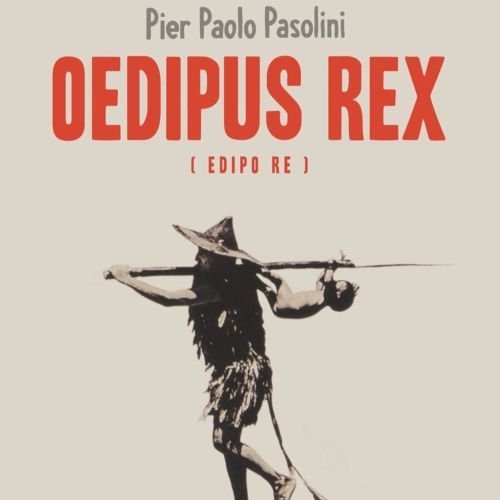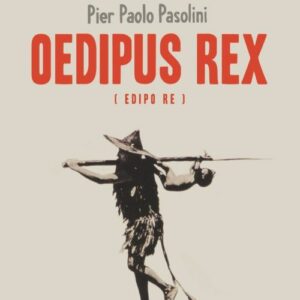
Oedipus Rex (1967)
| Description | |
|---|---|
| Country of Origin | Italy |
| Language | Italian |
| Genre | Drama |
| Cast | Silvana Mangano, Franco Citti, Alida Valli, Carmelo Bene, Julian Beck |
| Directed by | Pier Paolo Pasolini |

Pier Paolo Pasolini’s Oedipus Rex (1967) is a hauntingly poetic interpretation of one of the most enduring myths in Western literature. It draws from the ancient Greek tragedy by Sophocles while imbuing it with Pasolini’s own complex blend of psychoanalysis, Marxism, and deeply personal symbolism. Far from being a faithful adaptation in the traditional sense, this film is a surreal meditation on fate, identity, and the burden of inherited destiny. It transforms the Oedipus myth from a historical tale into an intensely introspective and mythologically resonant cinematic experience.
The film begins in 1920s fascist Italy with a prologue that is entirely Pasolini’s invention. A baby boy is born to a soldier and his wife—a sequence that symbolizes the birth of Oedipus and perhaps even the director himself. This modern-day prelude is not part of the Greek original, but it lays the foundation for the film’s autobiographical undercurrent. From there, the story shifts to an ancient, otherworldly setting as the boy is abandoned in the desert, echoing the myth’s central premise. By setting up a modern framework around the ancient myth, Pasolini blurs the boundaries between time, memory, and mythic narrative.
The mythological essence of the film is heightened through Pasolini’s visual and aesthetic choices. The desolate landscapes of Morocco, where much of the film was shot, provide an otherworldly backdrop that removes the story from any identifiable historical period. This ambiguity reinforces the idea that Oedipus is not a man of one time or place, but an eternal figure—the embodiment of human suffering, pride, ignorance, and awakening. Costumes in the film are deliberately eclectic and anachronistic, mixing ancient, tribal, and surreal elements. These choices strip the story of realism and root it firmly in the timeless world of myth.
At the heart of the film lies the myth of Oedipus, a man fated to kill his father and marry his mother. Pasolini adheres to the original structure but intensifies its psychological and emotional elements. Oedipus, played by Franco Citti, is portrayed not just as a tragic hero but as a volatile, emotional, and increasingly paranoid man. His arrogance, his thirst for truth, and his inability to heed warnings from oracles and prophets drive the film forward with a sense of inevitable doom. His journey becomes a symbolic rite of passage—one that mirrors the human search for meaning, self-awareness, and the terrifying realization of one’s own flaws.
Mythologically, Oedipus Rex engages deeply with the themes of fate and prophecy. The film remains faithful to the notion that fate is unavoidable—no matter how hard one tries to escape it. Pasolini doesn’t dilute this central truth of the myth. Instead, he magnifies it, portraying a world in which the gods’ silence is deafening and human beings are left to suffer the consequences of cosmic declarations. The oracles and seers in the film serve as eerie reminders of the fate awaiting Oedipus, but his pride and impulsiveness keep him blind to their truths—until it is too late.
Blindness itself becomes a recurring motif, both literally and metaphorically. Oedipus is metaphorically blind to his own identity and guilt until the truth erupts, leading to his physical blinding. Pasolini uses this moment as a climactic turning point, a symbolic act of punishment, purification, and transformation. It is not only a personal tragedy but also a mythic event that speaks to the larger human condition—the price of knowledge and the cost of self-realization.
The absence of divine intervention in the film is striking. Although the myth is rooted in divine prophecy and the will of the gods, Pasolini removes overt religious presence. Instead, he focuses on the internal and psychological dimensions of the myth. The suffering in the film is human, and the silence of the gods makes the tragedy even more profound. This interpretation aligns with Pasolini’s atheistic worldview, framing the myth not as a story of divine justice but as a commentary on existential despair and the societal forces that shape human destiny.
Pasolini also uses the myth as a vehicle to explore political and psychological themes. The prologue and epilogue, set in 20th-century Italy, reflect Pasolini’s critique of fascism and authoritarianism. Oedipus, in this reading, becomes a symbol of modern man—alienated, blinded by pride, misled by flawed institutions, and ultimately punished by the very truths he tries to uncover. His downfall is not just personal but systemic. This political reading of myth elevates Oedipus Rex beyond a classical tragedy into a modern allegory.
The final scenes of the film return to the modern setting, with Oedipus now blind, wandering through the city. His mythic journey is complete, but his suffering continues, stripped of all regal identity and consumed by the weight of truth. In these moments, Pasolini’s film offers a chilling reminder that myths are not relics of the past—they are living, breathing commentaries on the human soul, forever echoing in our lives.
In Oedipus Rex, Pasolini does not simply retell a myth—he resurrects it, distorts it, and recontextualizes it for a modern audience. The result is a deeply unsettling yet profoundly moving film that engages with mythological material not as passive narrative but as a vital source of insight into human nature. It is a cinematic odyssey through the heart of myth, a bold exploration of identity, fate, and the unrelenting pursuit of truth. Whether viewed through a mythological, psychoanalytic, or political lens, Pasolini’s Oedipus Rex remains one of the most thought-provoking myth-inspired films ever made.





